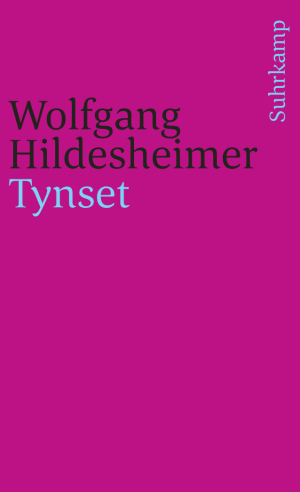
Wolfgang Hildesheimer
Wolfgang Hildesheimer was born on 9 December 1916 in Hamburg and died on 21 August 1991 in Poschiavo, Switzerland. He spent his childhood in Hamburg, Berlin, Nijmegen (Netherlands), and Mannheim. After completing an apprenticeship in carpentry in Palestine, where his parents had emigrated to, he studied painting, textile design and stage design at the Central School of Arts and Crafts in London from 1937 to 1939. After the beginning of World War II, he returned to Palestine and worked as a freelance graphic designer and painter in Tel Aviv and Jerusalem. In 1946 he worked at the Nuremberg trials as a simultaneous interpreter and court stenographer. Afterwards, he turned to writing and became a member of the Group 47. He caused a sensation with the speech he gave on the occasion of the International Theatre Week of the Student Theatre Groups in Erlangen entitled On the Theatre of the Absurd. In 1980 he gave the opening speech (What Does Music Reveal) at the...
Wolfgang Hildesheimer was born on 9 December 1916 in Hamburg and died on 21 August 1991 in Poschiavo, Switzerland. He spent his childhood in Hamburg, Berlin, Nijmegen (Netherlands), and Mannheim. After completing an apprenticeship in carpentry in Palestine, where his parents had emigrated to, he studied painting, textile design and stage design at the Central School of Arts and Crafts in London from 1937 to 1939. After the beginning of World War II, he returned to Palestine and worked as a freelance graphic designer and painter in Tel Aviv and Jerusalem. In 1946 he worked at the Nuremberg trials as a simultaneous interpreter and court stenographer. Afterwards, he turned to writing and became a member of the Group 47. He caused a sensation with the speech he gave on the occasion of the International Theatre Week of the Student Theatre Groups in Erlangen entitled On the Theatre of the Absurd. In 1980 he gave the opening speech (What Does Music Reveal) at the Salzburg Festival. Apart from his literary works, Hildesheimer also created collages which he assembled in several volumes.
PUBLICATIONS

Mozart
In this definitive biography, Wolfgang Hildesheimer demythologizes Mozart, revealing him as a flawed and puzzling human being, but a matchless artist. Hildesheimer's fresh approach to the music...
USA (FSG), Chinese simplex rights (East China Normal UP), Italy (RCS /Rizzoli), Sweden (Norstedts)
Previously published in the respective language / territory; rights available again: UK & Commonwealth (Dent), Spanish world rights (Destino), Brazilian Portuguese rights (Zahar), France (Lattès / Presses Pocket / Bartillat), Netherlands (Arbeiderspers), Denmark (Bogans), Finnland (Otava), Korea (National Research Foundation of Korea), Japan (Hakusuisha), Czech Republic (Arbor Vitae), Slovakia (Opus), Hungary (Gondolat), Serbia (Dereta), Slovenia (Obzorba)

Tynset
Tynset, a small community in Norway, is the magical focal point of the excessive monologue in which the protagonist unfurls the inventory of his life and his consciousness during one long,...
English world rights (Dalkey Archive), France (Gallimard)
Previously published in the respective language / territory; rights available again: Spanish world rights (El Olivo Azul), Italy (Il Mosaico), Netherlands (Bruna & Zoons), Norway (Det Norske Samlaget), Japan (Chikuma Shobo), Poland (Panstwowy Instytut Wydawniczy), Czech Republic (Odeon), Slovakia (Slovensky Spisovatel), Hungary (Europa), Bulgaria (Narodna Kultura), Estonia (Hea Lugu Oü)
Domestic Rights Sales: German Audiobook (kunstvolk)

Loveless Legends
Estonia (Loomingu Raamatukogu)
Previously published in the respective language / territory; rights available again: Spanish World Rights (Magisterio Espanol), Italy (Marcos y Marcos), Czech Republic (Odean)
Domestic Rights Sales: German Special Edition (Faber & Faber Verlag)